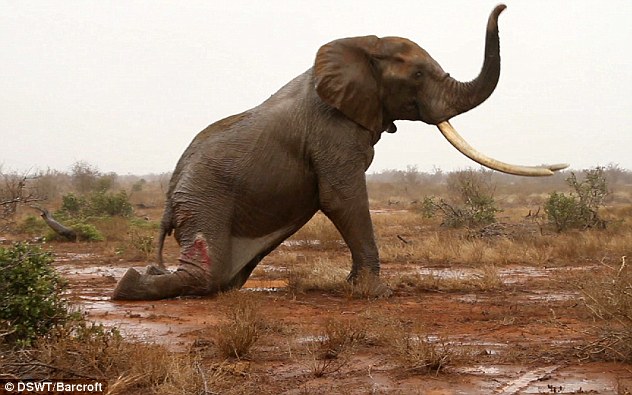Detroit Free Press
Elephants die in a spate of poisonings tied to poaching
Robyn Dixon, Los Angeles Times (TNS) 9:35 p.m. EDT October 18, 2015
BC-ZIMBABWE-ELEPHANT
(Photo: Tsvangirayi Mukwazhi/Associated Press)
13 CONNECT 26 TWEETLINKEDIN 1 COMMENTEMAILMORE
JOHANNESBURG, South Africa – The elephant died in agony. When they found his body, his eyes were closed, and a stream of blood trickled from his trunk.
He was a middle-age male, one of 40 elephants poisoned in Zimbabwe in recent weeks.
“I get choked up, even as I speak,” said Debbie Ottman of the Kariba Animal Welfare Fund Trust in Zimbabwe. She was one of the animal welfare activists who found the carcasses of three elephants near the town of Kariba in northern Zimbabwe late last month; the pachyderms tested positive for cyanide poisoning. “It makes me very angry and very emotional.”
The killer baited oranges with cyanide, which is used in illegal gold mining and which was found in the gut of the male elephant. Rampant poaching, coupled with legal hunting, has decimated populations in many areas, with 100,000 elephants killed in Africa from 2011 to 2013, according to the International Union for Conservation of Nature.
DETROIT FREE PRESS
Conservationists warn: Elephants are vanishing
Tanzania’s elephant population plummeted by 60%, to 43,330 in the five years ending in 2014, according to the Great Elephant Census, carried out by a coalition of wildlife groups. Mozambique lost half its elephants in the same period, falling to 10,300.
The statistics underscore the toxic mix of determined criminal gangs, corrupt government officials and a strong market for smuggled ivory in Asia — particularly in China, which has deepened its economic ties to Africa in recent years.
Tanzania last week arrested a Chinese businesswoman, Yang Fenglan, 66, also known as the “Queen of Ivory,” accused of involvement in millions of dollars in ivory deals. In May, Mozambican authorities seized 340 tusks, or 2,650 pounds of ivory, and 65 rhino horns. Two Chinese nationals were arrested, one of whom is also accused of offering police a $34,000 bribe to drop the charges.
News of the spate of Zimbabwe cyanide poisonings, blamed on poachers, comes as conservationists reported Saturday that a well-known elephant from South Africa’s Kruger National Park, one of the park’s biggest tuskers, was killed by hunters after wandering across the border into Zimbabwe.
Wildlife conservationists are livid about the shooting of an elephant said to be one of the biggest in Africa. The elephant was killed by a “foreign client” in a safari hunting area bordering Gonarezhou National Park in south-east Zimbabwe, the national parks said in a statement. The killing was legal but “unethical,” said Johnny Rodrigues of the Zimbabwe Conservation Taskforce.
The elephant was killed Oct. 7, the Associated Press reported; its ivory tusks weighed 121 pounds and 119 pounds, the news agency said, quoting the parks.
“That’s a premium trophy,” said Professional Hunters and Guides Association president Louis Muller. “Some big game hunters can come back to Zimbabwe every year for 30 years and spend up to a million dollars over that period with the hope of killing such an animal.”
The controversy over the elephants come after the killing of a well-known lion named Cecil in July sparked international outrage.
South African wildlife group, the Conservation Action Trust, said the bull elephant killed by hunters in Zimbabwe was probably Nkombo, who was collared years ago in Kruger National Park but lost his collar last year. The trust said hunting websites were abuzz with excitement about the killing of the animal with 122-pound tusks, adding it was probably the biggest bull killed since 1986.
After 14 elephants were killed by cyanide in the last week and in late September, Zimbabwean authorities announced last week that 26 more had been found poisoned in recent days at two sites in Hwange National Park, famous for its elephants.
In Zimbabwe’s current desperately dry and harsh conditions, the poachers placed salt laced with cyanide near wildlife watering holes, killing not only the elephants but other animals too, including predators feeding off the pachyderms’ carcasses.
Zimbabwe’s economic crisis has exacerbated the poaching spree, as criminal gangs move in, luring the rangers who are supposed to protect the animals into either offering information or even killing the animals. Authorities recently arrested several wildlife officials for involvement in poaching of elephants.
Dave Dell of Friends of Hwange, which raises donations to run pumps for about 80 watering holes in Hwange National Park, said cyanide poisoning was again increasing, after an incident two years ago in which up to 300 elephants were poisoned.
“The authorities are doing their best. We are doing our best to clamp down on it. But the situation in this country is so desperate that people will go and do something stupid for $100,” he said.
DETROIT FREE PRESS
Staff arrested for poaching in African wildlife reserve
The elephants traveling in family groups are attracted to the water and salt, he said. “Usually they don’t get more than 100 meters” after taking the poison, he added. “The suffering is horrible. They get weak very quickly and collapse. You might not die quickly.”
The cyanide poisoning is indiscriminate and often kills mothers and calves with no tusks. The elephants poisoned near Kariba all had their tusks, so authorities believe a poaching attempt was botched or interrupted.
In Zimbabwe, some of those who have spoken out against corrupt government officials involved in poaching, ivory smuggling and illegal hunting have received death threats. “You have to fight it quietly, behind the scenes,” said one, who requested anonymity.
“Until there’s a change in our economic situation or a change in our government situation, it’s going to be a resource they’re going to plunder until there’s nothing left.”
DETROIT FREE PRESS
